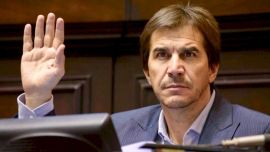Next year, Cristian Ritondo will be a gubernatorial hopeful for Buenos Aires Province. But the 56-year-old Juntos por el Cambio politician, who served as security minister in the region when María Eugenia Vidal was governor, has of late been caught up in a maelstrom of accusations between Elisa Carrió and San Isidro Federal Judge Sandra Arroyo Salgado connecting him to individuals allegedly linked to drug-trafficking.
Ritondo denies the claims and in a feature interview distances himself from hate speech, assuring that his party contains “militants of peace.”
Where did you pick up your special interest in crime-fighting and how did it develop?
Historically and unfortunately, crime has always been one of our great structural problems in Argentina, like a poverty of 30 percent, sometimes a bit less.
Sometimes both are even connected.
Alongside that poverty of 30 percent, like our other structural problem with inflation and the fiscal deficit in Argentina, crime is another major problem but one which hits hard and when the economic issues straighten themselves out a bit, it comes to be the top problem. You have to dedicate time in order to become an expert.
I worked at a very young age with Miguel Ángel Toma, who was security secretary and afterwards Interior minister, chairing the [lower house] committee which elaborated the Domestic Security Law. On that basis I had a training leaning towards law and order issues because that was a serious concern and it seemed to me it needed to be studied in order to solve it, lending structure to security in Argentina and in Buenos Aires Province and City. I had the good fortune to co-author the law creating the Buenos Aires Metropolitan Police in 2008 when I was a City legislator. In 2007 the law prohibiting the City from having its own police was repealed with a transfer arriving much later when Mauricio Macri was president and Horacio [Rodríguez Larreta] mayor. It was decided to transfer the Federal Police based in this city to its government, leaving a truly Federal Police which had nothing to do with urban policing, instead safeguarding embassies, ministries and other federal places in this city which had to be guarded. That was a very important change. I dedicated myself to this, travelling, studying and doing courses.
So your diagnosis was that there were two important problems in Argentina – poverty, with the economy, and crime and you thought that you should specialise in one of those two major problems.
Yes, because crime in today’s world has ceased to be a problem, save in underdeveloped countries, although there are...
…isolated cases.
But it’s not an everyday problem on the scale of not being able to go out in Greater Buenos Aires after 7pm when the shopping centres close because each shop is afraid of being left alone in the zone. Our problem is a crime every two minutes and a daily femicide in Greater Buenos Aires in the last five days. This has to do with understanding that crime must be confronted with long-term policies and structural reforms, which takes its time – because it takes time to train a provincial police, for example, just as it takes time to educate children. You can only promote anybody in their sixth year and of the four years in government, it takes three to train that police. That ought to be a state policy across party lines. That’s why the course to train the provincial police should be approved by the Buenos Aires educational authorities to make it a professional career.
When María Eugenia Vidal governed Buenos Aires Province, we created a [Police] university but we could not start it up although the law was approved. It is a very important issue for me that those who reach senior posts be professionally trained. The school of higher studies which we fixed and repaired in Buenos Aires Province is very important. I believe that training goes a long way towards having a quality police because what matters is not their quantity but their quality. You can have 20 policemen on a block who have no idea what to do in the face of a crime and you can have one single cop who knows how to solve it. That’s what one must aim at with all the means at hand – computer technology, [security] cameras, smart detection, all part of a well-trained police.
Weeks later, what is your hunch about the assassination attempt against the vice-president? What happened there?
I trust those in charge of the case, both [prosecutor Carlos] Rívolo and [the judge María Eugenia] Capuchetti who are doing a good and very professional job over and above all the media and political pressures they suffered.
For this type of case the time which has gone by may seem very long but it’s very short in terms of the investigation, for all that needs to be made known and read, the information received, the witnesses summoned, the television and other cameras of the previous days, the police work and singling out the same individual. All the investigative work which has to be done, often by the federal forces, but they must be directed by the prosecutor and judge.
Not much time has gone by yet up to now there are four people with established links under arrest and two of them indicted so the work being done seems to me important. As for the security, what I have to say and have said in public is that the bodyguard was a disaster if a pistol could be fired within 20 centimetres or less of the ex-president without the bullet leaving the gun.
All the protocols tell you what must be done ... which was everything her bodyguard did not do.
What is the motive leading [the attackers] to do what they did?
I understand when they are described as a group of wackos but I have no further data for now. It is impossible to think that they were a group of professionals reading their chats: “What a pity that the gun did not go off,” “Now it’s my turn.”
In the case of professional criminals or a terrorist cell, nobody could imagine them talking in that form between so many people. If there is one thing they have in common, it is that they are completely careless and one of the main techniques of terrorist groups is to keep the information close to their chests, not all of them even have the information. So I do not believe that it was something plotted and financed with a group of professionals, at least not from what I have seen until now. According to the information I have, which is public domain, they show none of the requisites for being a terrorist group or professionals. Now one might say they are a group of nutcases who dared to take a pot shot at the vice-president, maybe.
There are crackpots who have killed great people in the history of the world. We must let the courts continue advancing in their work.
All the bombardment seems bad to me, and far worse from those who define this as a consequence of the opposition, the media and the judiciary because these all have a fundamental role which bothers Kirchnerism. It bothers them that the media expose their narrative, that the courts set limits to them and that the opposition seeks to have [and may well win] the power they have today.
This week we had our monthly meeting at the Academia de Periodismo with Marcelo Longobardi expounding on the polarisation in the United States and here the problem is exactly the same – a polarisation within society and among the media. The discussion is whether society defines the media or the media society, the interaction between both, including that term of hate speech used in the United States. The classic example was the storming of the US Capitol by those people who also seemed crackpots. Now a bunch of loonies constitutes a problem transcending the individuals involved.
Without doubt. And that is for a more sociological study of society beyond a political culture pretty different from ours today. The Uruguayan plebiscite was almost 50/50. The election in Chile saw the meteoric emergence of its president today, [Gabriel] Boric. Or the phenomenon of Colombia’s election. Not only looking at the United States but when you start to look at the map of countries with post-pandemic elections where there were surprises, the meteoric appearances of new figures who did not even exist in the previous midterms and today have come close to or reached the presidencies. Looking at Colombia’s election, one would think that the candidate finishing in third place had the most skills and the greatest political experience to be president...
With the two main coalitions finishing in third and fourth place.
Sure and looking at the first and second, it seems almost illogical that the left should now be governing Colombia while a practically unknown candidate took him to a run-off.
Since you head the PRO lower house caucus, your party’s deputy for San Luis Karina Ethel Bachey has among her team of advisors the lawyer of [‘candy floss gang’ leader Nicolás] Gabriel Carrizo, Brenda Salva. Bachey, who reached Congress under the wing of [PRO chair] Patricia Bullrich and City Hall’s Strategic Affairs Secretary Eduardo Macchiavelli, said that when she found out that her advisor had taken the case of the copitos candy floss gang, she initially decided to keep her on because she is a very efficient worker.
Karina Bachey has requested her irreversible resignation. I’d like to say that she [Salva] is a lawyer but has also been a journalist on various television channels. I’ve been on panels with her and I have no doubt from our conversations that she did a good job for the deputy Karina Bachey. But the deputy told me that she found out subsequently that she had accepted the case, almost reading about it in the newspapers, and when she confirmed that, she took the decision to eject her from her team of collaborators.
Meanwhile Chubut Senator Ignacio Torres, who happens to sit on the bicameral committee monitoring the intelligence services, included among his aides, Gastón Arano, another lawyer of Carrizo. Does it worry you to see certain links between those people and Juntos por el Cambio?
I’m going to say a couple of things which I hope are interpreted properly. In reality one problem of Congress these days, along with other state instances, is that when you want to have a good professional, the pay is very meagre for a practising lawyer of quality. There is often no control over who is hired.
In this case Senator Nacho Torres dumped his aide immediately, followed by Karina Bachey. I know them both because Nacho Torres was a deputy in my caucus until last year when he won the senatorial elections in Chubut. He’s very young. Both persons in question had already been working in Congress with other deputies and with another senator, both had been recommended and both were apparently good professionals. Nor do they cease being so for the cases they picked up because they have all the right in the world as lawyers to defend whoever they want but they should understand that when one is in public service, this affects not only the legislators but the parties they represent. So it seems to me an error when accepting a state post to defend a case of this nature.
Two cases do not permit anything more than conjecture and no definite conclusion can be reached. But does the proximity of Revolución Federal to the libertarians and, by transition, to PRO hawks bother you?
Firstly, we are militants of peace, over and above possessing firmness and decision. In my particular case, I see Kirchnerism as a political adversary, not as an enemy – my enemies are the drug-traffickers, the violent, the criminals. Enemies have to be beyond politics. The other side of politics, no matter how many differences we might have, has to be the adversary within democracy. And the weapons to defeat that adversary have to be proposals, debate, firmness.
When you decide to live in democracy, that means democratic co-existence. In Parliament you can only talk, although you must debate firmly. So I have an outlook rejecting political violence, whether from the right or left. I do not come from that generation of the 1970s because, although born in 1966, I was very small then – in 1976 I was 10 years old. Even if my political activism began in the last years of the dictatorship when I rejected the silence of the politicians and the media. Not knowing what was happening, not knowing the truth, that those who dared suffered the consequences for both their families and their own lives.
It seems to me that this should make us all rethink how we should coexist from here on. Because these violent groups, who yell out anything, hit out in all directions because they do not differentiate between parties. This group at the doors of Congress insults anybody quite groundlessly. It has happened to [Córdoba Radical deputy] Rodrigo de Loredo but it also happened to [PRO deputy] Waldo Wolff and me a fortnight ago when we were entering Congress.
The truth is that this degree of violence must be rejected. And of course I do not want to see any of that within Juntos por el Cambio. I believe that we express something else to society – change with firmness and conviction but understanding that we want the coexistence of all Argentines.
Regarding the libertarians, how does [Javier] Milei’s discourse strike you, for example?
Milei has a strong discourse to express his ideas, some of which I might agree with and others not while others do not remain entirely clear to me without venturing into more humane questions on which he has expressed a stance which I do not share. Nor do I share his pledge “to blow up the Central Bank with dynamite” because the truth is that all capitalist countries which function well have central banks. Now we can discuss that they must be independent and autonomous but what we cannot debate is that a Central Bank is useful for regulating currency floats and many other things.
One thing we journalists discuss is to what extent verbal violence promotes and legitimises actual violence. Some mental illnesses prevent a distinction being made between the metaphorical and the literal. Should not all this madness surrounding the assassination attempt and Revolución Federal help us to reflect on verbal violence and lower the decibels?
Yes, perhaps so. As for Javier Milei, I coexist with him in Congress but the truth is that I have a good personal and professional relationship with Javier although we vote differently.
You’ve already confirmed your gubernatorial candidacy in Buenos Aires Province. Might it be said that the competition is between Ritondo and [Diego] Santilli at provincial level and Bullrich versus [Rodríguez] Larreta at national level?
There is still no done deal. First of all, we have to carry on doing what I was talking about at the beginning, being able to say what our ideas are, why we want to return [to power], ratifying what we plan to continue and being clear about what the measures are with a message to society and not bother so much about candidacies.
I think within Juntos por el Cambio, PRO might have three candidates, as I told María Eugenia Vidal and Mauricio, who will have to decide whether he wants to run or not – he’s the one with the most experience, the leader of PRO and beyond doubt a unique reference within Juntos por el Cambio. And in Buenos Aires Province there are these two names, Diego’s and mine, to which should be added those of important mayors like Javier Iguacel, Joaquín de la Torre and Néstor Grindetti, who have also expressed their wish to participate. There is still a long time to go before we decide the names of those who are going to present ourselves in the PASO primaries.
Beyond doubt Patricia, Horacio, Santilli and myself have all declared that we are going to be candidates and perhaps today’s opinion polls are looking much more at us but there are others as well. I believe that to go to the polls we must not only be competitive but have very clear ideas.
Does it bother María Eugenia Vidal, your drawing closer to Patricia Bullrich?
No, because my presidential candidate is María Eugenia Vidal. With Patricia, and with all the provincial team, we have agreed to work together in Buenos Aires Province because our idea of government, of thinking how to govern with all the decisions and the transformations we have to make places us on track. Patricia, as I have said before, is also accompanied by Joaquín and Javier, who are good candidates, and my idea is that together we build a vision for Buenos Aires Province saying why we want to return and govern and what we’re going to do and that we will have to try and do it together, that’s what I’m trying to make all of us see. My presidential candidate is María Eugenia Vidal for her age, because I know her and because I believe that she synthesises the administrative capacity and courage to govern Argentina.
And not Patricia Bullrich?
I’m not saying no to anybody. My candidate is María Eugenia Vidal. I recognise many virtues in Patricia and Horacio and I think sometimes it is a problem, if truth be told, that we have three or four presidential candidates of such a high level with so much public recognition. I know that sometimes it can be a problem to have four centre forwards who all play very well but it’s better to have that kind of problem.
Now that we are reaching the end of this interview, if you were governor, what measures would you take first?
My first decree would be a 55 percent reduction of the political public posts, which [current governor Axel] Kicillof doubled and I believe that the province can manage with less than half of what it has today, which would be a big saving. I would return to the transformation of the provincial police which we were carrying out and to the logic of a police academy to train them, as well as to the combat against drug-trafficking and mafias in Buenos Aires Province. Those mafias, hooligans, contraband dealers and extortionate crime syndicates should understand that we will return to the attack against them with a vengeance. And also take the state out of all those unjustifiable loss-making enterprises which only end up conferring privileges which are paid by each and every citizen in the form of not having drinking water or paved streets. To give you an idea, just the [Greater Buenos Aires district of] Moreno has 20,000 blocks without paved streets. For every peso misallocated by the Buenos Aires provincial government, there is somebody without asphalt whose children cannot go to school when it rains hard and where an ambulance cannot enter when there is a problem.
Production: Sol Muñoz and Sol Bacigalupo



















Comments